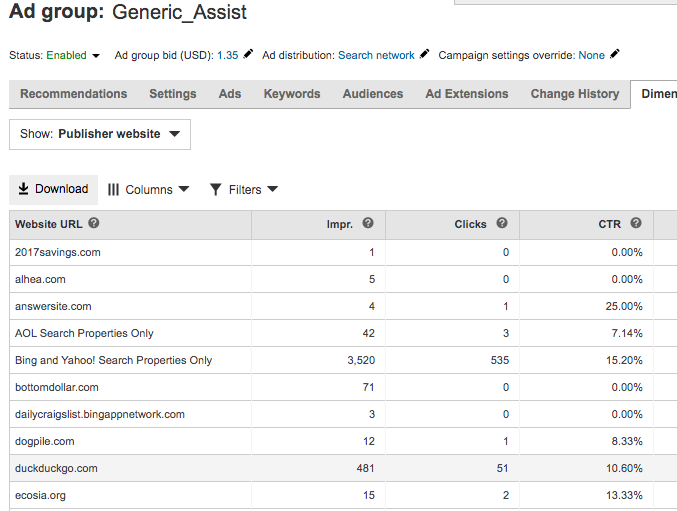DuckDuckGo is a general-purpose search engine that shows results from its own index and about 400 trusted sources. It does not collect or share users’ personal information. This single fact could make it popular with tech-savvy, privacy-conscious consumers.
To some, the results it provides may not be as relevant or personalized as Google or Bing. However, DuckDuckGo offers a greater level of privacy than many search engines.

DuckDuckGo may be popular with folks concerned about privacy.
Search History
DuckDuckGo does not keep track of what a user looks for online. To quote the company’s website, “When you search at DuckDuckGo, we don’t know who you are and there is no way to tie your searches together.”
Other search engines store a lot of information about each user’s queries, including the keyword phrases.
Also, those search engines likely track the search-result links someone clicked on. And the information collected will almost certainly include an internet protocol (IP) address and some of the specifics about the user’s browser.
Taken together, this information could identify an individual and match that person directly with his search history.
If users have signed into an account with the search engine, their email address and name may also be associated directly with the search queries.
Search engines use this information to personalize search results and show more relevant ads. There is, however, a privacy threat. For example, search history could be subpoenaed in criminal investigations and even some civil lawsuits. And search engine companies could have data breaches that release much private information.
“The bottom line is if search engines have your information, it could get out, even if they have the best intentions. And this information (your search history) can be pretty personal,” according to the DuckDuckGo privacy policy.
Search Leakage
When a user clicks a link on a typical search engine results page, the search term, the user’s IP address, and browser information may be passed directly to the target site.
DuckDuckGo redirects links to conceal the search term. Thus, the target site will know you visited, but it will not know the keywords.
Folks who use DuckDuckGo in combination with Tor, which enables anonymous communications, can visit a site without sharing the search query or their identity.
Market Share
DuckDuckGo had a 1.34 percent share of the total U.S. search engine market in December 2019, according to Statcounter. Worldwide, DuckDuckGo had less than half a percent of the search engine market.
That might seem insignificant. But DuckDuckGo’s seemingly tiny share of the search market is roughly 50 million searches a day.
What’s more, “Even though DuckDuckGo has only a small slice of the search market, it has a significant share among a certain slice of the population — i.e., tech-savvy individuals with money who are concerned about their privacy,” wrote Nate Shivar, who runs ShivarWeb, a digital-marketing publication.
If your business sells products to this consumer segment, Shivar argued, DuckDuckGo could be a good way to reach them.
No one knows precisely who is using DuckDuckGo. The company itself doesn’t even know since its key feature is that it doesn’t track users.
We can, however, make some assumptions. As Shivar points out, DuckDuckGo users are probably tech-savvy, since changing the search engine in your browser requires relatively more expertise.
Again as Shivar points out, DuckDuckGo users presumably care about privacy.
If you believe your customers could match this potential profile, advertising on DuckDuckGo could a good way to reach them.
Microsoft Ads
Unfortunately, at the time of writing, a business could not place an ad on DuckDuckGo directly.
Rather, the ads that appear on DuckDuckGo’s search results pages come from the Bing and Yahoo advertising network. Thus, to place an ad on DuckDuckGo, you need to create a campaign with Microsoft Advertising.
In his article, Shivar goes into great detail about how to isolate DuckDuckGo within a Microsoft Advertising campaign. The approach can be distilled to:
- Create a campaign,
- Distribute ads to syndicated search partners,
- Exclude all partners except DuckDuckGo.
When placing those ads, add URL parameters that specify DuckDuckGo as the source. Otherwise, the source will show up in Google Analytics as “Bing.”
Running a few tests could help determine if advertising on DuckDuckGo via Microsoft Advertising is a cost-effective way to reach potential customers.
European Expansion
Beyond the privacy-conscious and tech-savvy, DuckDuckGo could soon be an important search engine on Android devices in the European Union.
Google, which makes the Android operating systems, will soon offer E.U.-based Android users a selection of search engine options. The list includes DuckDuckGo, in addition to Google, Bing, and Yahoo.
Moreover, for many European nations DuckDuckGo will appear near or at the top of the list.





